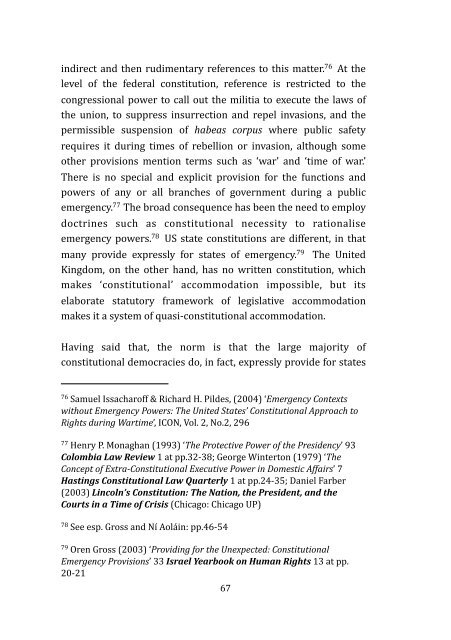States of Emergency - Centre for Policy Alternatives
States of Emergency - Centre for Policy Alternatives
States of Emergency - Centre for Policy Alternatives
Create successful ePaper yourself
Turn your PDF publications into a flip-book with our unique Google optimized e-Paper software.
indirect and then rudimentary references to this matter. 76 At the<br />
level <strong>of</strong> the federal constitution, reference is restricted to the<br />
congressional power to call out the militia to execute the laws <strong>of</strong><br />
the union, to suppress insurrection and repel invasions, and the<br />
permissible suspension <strong>of</strong> habeas corpus where public safety<br />
requires it during times <strong>of</strong> rebellion or invasion, although some<br />
other provisions mention terms such as ‘war’ and ‘time <strong>of</strong> war.’<br />
There is no special and explicit provision <strong>for</strong> the functions and<br />
powers <strong>of</strong> any or all branches <strong>of</strong> government during a public<br />
emergency. 77 The broad consequence has been the need to employ<br />
doctrines such as constitutional necessity to rationalise<br />
emergency powers. 78 US state constitutions are different, in that<br />
many provide expressly <strong>for</strong> states <strong>of</strong> emergency. 79 The United<br />
Kingdom, on the other hand, has no written constitution, which<br />
makes ‘constitutional’ accommodation impossible, but its<br />
elaborate statutory framework <strong>of</strong> legislative accommodation<br />
makes it a system <strong>of</strong> quasi‐constitutional accommodation.<br />
Having said that, the norm is that the large majority <strong>of</strong><br />
constitutional democracies do, in fact, expressly provide <strong>for</strong> states<br />
76<br />
Samuel Issachar<strong>of</strong>f & Richard H. Pildes, (2004) ‘<strong>Emergency</strong> Contexts <br />
without <strong>Emergency</strong> Powers: The United <strong>States</strong>’ Constitutional Approach to <br />
Rights during Wartime’, ICON, Vol. 2, No.2, 296<br />
77<br />
Henry P. Monaghan (1993) ‘The Protective Power <strong>of</strong> the Presidency’ 93<br />
Colombia Law Review 1 at pp.32‐38; George Winterton (1979) ‘The <br />
Concept <strong>of</strong> Extra‐Constitutional Executive Power in Domestic Affairs’ 7<br />
Hastings Constitutional Law Quarterly 1 at pp.24‐35; Daniel Farber<br />
(2003) Lincoln’s Constitution: The Nation, the President, and the <br />
Courts in a Time <strong>of</strong> Crisis (Chicago: Chicago UP)<br />
78<br />
See esp. Gross and Ní Aoláin: pp.46‐54<br />
79<br />
Oren Gross (2003) ‘Providing <strong>for</strong> the Unexpected: Constitutional <br />
<strong>Emergency</strong> Provisions’ 33 Israel Yearbook on Human Rights 13 at pp.<br />
20‐21<br />
67











